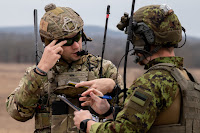Specialized Training and Skills:
Air Force Combat Controllers undergo rigorous training, encompassing a range of specialized skills. They are experts in air traffic control, parachute operations, land navigation, and close air support coordination. Equipped with these skills, combat controllers are uniquely qualified to operate in diverse and challenging environments, both on the ground and in the air.
Precision Strike Coordination:
One of the primary responsibilities of combat controllers is the coordination of precision airstrikes. Working alongside ground forces, they communicate directly with pilots and provide critical information on target location, enemy positions, and friendly troop locations. Their expertise ensures accurate and effective strikes, minimizing collateral damage and maximizing the operational impact.
Forward Air Control:
Combat controllers serve as forward air controllers (FACs), working in close proximity to frontline troops. They embed with special operations units, infantry, and other ground forces, acting as a crucial link between ground and air assets. By coordinating and directing close air support, combat controllers facilitate real-time decision-making, situational awareness, and rapid response to emerging threats.
Establishing Airfield Operations:
In hostile and austere environments, combat controllers play a pivotal role in establishing and operating airfields. They possess the skills to assess, secure, and prepare landing zones, enabling the rapid deployment of aircraft, supplies, and personnel. Their expertise in air traffic control and landing zone operations ensures the safe and efficient movement of aircraft in challenging conditions.
Joint Special Operations Integration:
Air Force Combat Controllers seamlessly integrate with joint special operations forces, enhancing their effectiveness in complex operational environments. Their ability to collaborate and synchronize with Army Special Forces, Navy SEALs, and other elite units creates a synergistic effect, bolstering the overall capabilities and success of joint operations against terrorist organizations.
Humanitarian Assistance and Disaster Response:
Beyond their combat role, combat controllers are often called upon to provide humanitarian assistance and support during disaster response efforts. Their unique skill set allows them to rapidly establish communication and airfield capabilities in affected areas, enabling the delivery of critical supplies, medical assistance, and search and rescue operations. Combat controllers' adaptability and resilience make them an invaluable asset in addressing both military and humanitarian challenges.
Conclusion:
Air Force Combat Controllers are unsung heroes in the war on terror, executing a wide range of specialized tasks that contribute to mission success and the protection of national security. From coordinating precision airstrikes to establishing airfield operations and integrating with special operations forces, combat controllers exemplify the dedication, skill, and bravery required to combat terrorism effectively. Their contributions, often behind the scenes, play a vital role in safeguarding both military personnel and innocent lives.








No comments:
Post a Comment